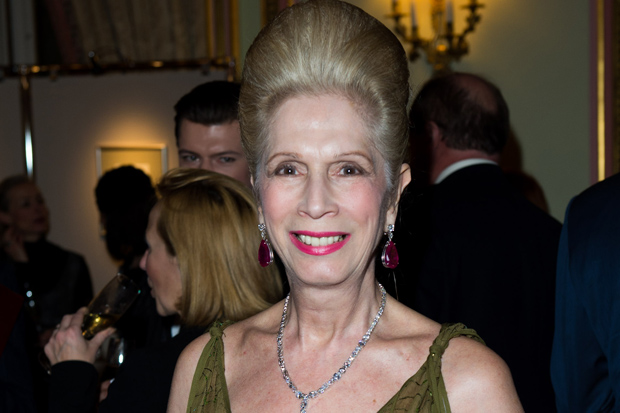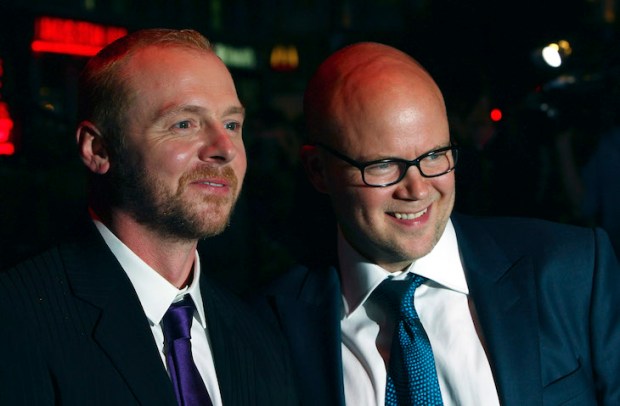Last week I put £25 on Lady C to win I’m A Celebrity… Get Me Out of Here. At 25/1, I thought it was quite a good bet – until she withdrew for medical reasons. For those not watching the 15th series of the jungle reality show, Lady C is Lady Colin Campbell, a self-proclaimed ‘socialite’ and author of several royal biographies. Some of her fellow contestants, such as ex-Spandau Ballet frontman Tony Hadley, have accused her of not being a ‘real lady’, but they don’t have a clue, obviously. They mean she swears a lot, which hardly disqualifies her from being a toff. As it happens, her aristocratic credentials are a bit dubious — her title derives from her brief marriage to a relative of the Duke of Argyll – but she seems to delight in conforming to the upper-class stereo-type. When she did her first Bushtucker Trial, she apologised to Ant and Dec for not wearing her pearls, and she refers to Hadley as a ‘chippy oik’. Like Boris, she’s a pantomime toff, someone who exaggerates their poshness for theatrical effect, and the viewers seem to be lapping it up.
This confirms my theory that any antipathy the British public feels towards the upper class has dwindled away to almost nothing. Following Labour’s triumph at the 1945 general election, the aristocracy became convinced that the nation had been seized by revolutionary fervour and embarked on a frantic public relations offensive. Stately homes were demolished, accents were played down and ostentatious displays of wealth became taboo. As Nancy Mitford put it in her famous essay on the subject in 1956: ‘The English lord has been nurtured on the land and is conversant with the cunning ways of the animal kingdom. He has often seen the grouse settle into the heather to rise and be shot at no more.’
Whether as a result of this strategy or not, no serious attempt to redistribute wealth has taken place since the Attlee administration. One of the most striking facts about post-war politics is that if you discount the three victories won by Tony Blair — who was about as left-wing as David Steel — Labour hasn’t won a general election since October 1974 and that barely counted. Without Blair, Labour hasn’t won a convincing majority since 1966, almost 50 years ago. The politics of envy has failed.
To be fair, even the Tory party, which prides itself on understanding how to win and retain power, took a while to wake up to this. After Alec Douglas-Home failed to win in 1964, it concluded that the party should never again be led by a toff and the next three leaders seemed to vindicate that decision with varying degrees of success. But after three consecutive losses in 1997, 2001 and 2005, it was forced to re-evaluate this policy and put another Old Etonian in charge. Exactly 10 years later, David Cameron has proved to be one of the most successful leaders in the party’s history.
Some might argue that Cameron has only triumphed by toning down his privileged status — resigning from Whites in 2008, for instance – but such efforts have always been half-hearted. There’s a telling moment in Dan Hodges’ excellent new book about the general election, One Minute to Ten, when Cameron deliberates about whether to appoint Chris Lockwood as deputy head of his policy unit. He’s an old friend from a similar background and, at this point in the story, Cameron is under pressure to broaden his team. But he decided to appoint Lockwood anyway. ‘These were the sort of people David Cameron wanted in his inner circle,’ writes Hodges. ‘Not just people he could rely on. Or even people whose judgment he could trust. He wanted people he knew. People he could look into. People like him, in fact.’
Inside the Westminster bubble, the Prime Minister’s promotion of his friends to his inner circle is regarded as a political mistake, since it adds to the impression that he’s in politics to help out his rich chums. In fact, there’s no reason to think it has harmed his party’s electoral prospects. The British public isn’t nearly as obsessed by class as political journalists. In their eyes, I suspect, all politicians seem to be from another planet, with little attention paid to whether they went to Eton or Haverstock Comp.
That is why poor old Jeremy Corbyn, with his touching faith in class war, is doomed to failure. After he’s obtained national treasure status — the ultimate humiliation for anti-establishment rebels — he might want to take a turn in the jungle.
Got something to add? Join the discussion and comment below.
Get 10 issues for just $10
Subscribe to The Spectator Australia today for the next 10 magazine issues, plus full online access, for just $10.
Toby Young is associate editor of The Spectator.
You might disagree with half of it, but you’ll enjoy reading all of it. Try your first month for free, then just $2 a week for the remainder of your first year.















Comments
Don't miss out
Join the conversation with other Spectator Australia readers. Subscribe to leave a comment.
SUBSCRIBEAlready a subscriber? Log in